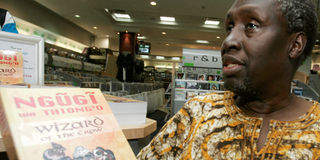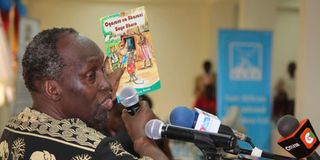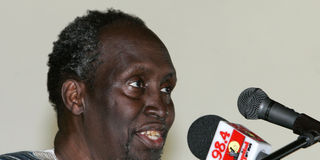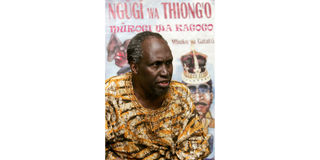Premium
Three things Ngũgĩ wa Thiong'o taught me: language matters, stories are universal, Africa can thrive

Kenyan author Ngugi Wa Thiong'o shows his newly launched book "Wizard of the Crow" during an interview with Reuters at a bookshop in downtown Nairobi January 16, 2007.
What you need to know:
- The celebrated Kenyan writer and decolonial scholar Ngũgĩ wa Thiong'o passed away at the age of 87, leaving behind an unparalleled legacy of creative works spanning multiple genres and two languages: English and Gĩkũyũ.
- His works have been translated and published worldwide. His journey was marked by early fame, political imprisonment for his play I Will Marry When I Want, and subsequent exile.
- His intellectual and literary evolution was profoundly shaped by the influence of his mother and his deep commitment to his native language, Gĩkũyũ.
- This language became the medium for his later seminal works, such as Devil on the Cross and Wizard of the Crow, and the subject of his critical theory in Decolonising the Mind.
Celebrated Kenyan writer and decolonial scholar Ngũgĩ wa Thiong'o passed away on 28 May at the age of 87. Many tributes and obituaries have appeared across the world, but we wanted to know more about Thiong'o the man and his thought processes. So we asked Charles Cantalupo, a leading scholar of his work, to tell us more.
Who was Ngũgĩ wa Thiong'o – and who was he to you?
When I heard that Ngũgĩ had died, one of my first thoughts was about how far he had come in his life. No African writer has as many major, lasting creative achievements in such a wide range of genres as Ngũgĩ wa Thiong'o. His books include novels, plays, short stories, essays and scholarship, criticism, poetry, memoirs and children’s books.
His fiction, nonfiction and plays from the early 1960s until today are frequently reprinted. Furthermore, Ngũgĩ’s monumental oeuvre is in two languages, English and Gĩkũyũ, and his works have been translated into many other languages.

Prof. Ngugi wa Thiong'o displays a copy of a story book written in vernacular to members of the public and students who attended his public lecture at Kisii University in this picture taken on August 31, 2015.
From a large family in rural Kenya and a son of his father’s third wife, he was saved by his mother’s pushing him to be educated. This included a British high school in Kenya and Makerere University in Uganda.
When the brilliant young writer had his first bifg breakthrough at a 1962 meeting in Kampala, the Conference of African Writers of English Expression, he called himself “James Ngũgi”. This was also the name on the cover his first three novels. He had achieved fame already as an African writer but, as is often said, the best was yet to come.
Not until he co-wrote the play I Will Marry When I Want with Ngũgĩ wa Mirii was the name “Ngũgĩ wa Thiong’o” on the cover of his books, including on the first modern novel written in Gĩkũyũ, Devil on the Cross (Caitaani Mũtharaba-inĩ).
I Will Marry When I Want was performed in 1977 in Gĩkũyũ in a local community centre. It was banned and Ngũgĩ was imprisoned for a year.
And still so much more was to come: exile from Kenya, professorships in the UK and US, book after book, fiction and nonfiction, myriad invited lectures and conferences all over the world, a stunning collection of literary awards (with the notable exception of the Nobel Prize for Literature), honorary degrees, and the most distinguished academic appointments in the US, from the east coast to the west.
Yet besides his mother’s influence and no doubt his own aptitude and determination, if one factor could be said to have fuelled his intellectual and literary evolution – from the red clay of Kenya into the firmament of world literary history – it was the language of his birth: Gĩkũyũ. From the stories his mother told him as a child to his own writing in Gĩkũyũ for a local, pan-African and international readership. He provided every reason why he should choose this path in his books of criticism and theory.
Ngũgĩ was also my friend for over three decades – through his US professorships, to Eritrea, to South Africa, to his finally moving to the US to live with his children. We had an ongoing conversation – in person, during many literary projects, over the phone and the internet.
Our friendship started in 1993, when I first interviewed him. He was living in exile from Kenya in Orange, New Jersey, where I was born. We both felt at home at the start of our working together. We felt the same way together through the conferences, books, translations, interviews and the many more literary projects that followed.

Ngũgĩ wa Thiong’o’s The River Between.
What are his most important works?
Since Ngũgĩ was such a voluminous and highly varied writer, he has many different important works. His earliest and historical novels like A Grain of Wheat and The River Between. His regime-shaking plays.
His critical and controversial novels like Devil on the Cross and Petals of Blood. His more experimental and absolutely modern novels like Matigari and Wizard of the Crow.

Kenyan author Ngugi Wa Thiong'o speaks during the launch of his new book "Wizard of the Crow" at the University of Nairobi January 15, 2007.
His epoch-making literary criticism like Decolonising the Mind. His informal and captivating three volumes of memoirs written later in life. His retelling in poetry of a Gĩkũyũ epic, The Perfect Nine, his last great book. A reader of Ngũgĩ can have many a heart’s desire.
My book, Ngũgĩ wa Thiong’o: Texts and Contexts, was based on the three-day conference of the same name that I organised in the US. At the time, it was the largest conference ever held on an African writer anywhere in the world.
What I learned back then applies now more than ever. There are no limits to the interest that Ngũgĩ’s work can generate anytime anywhere and in any form. I saw it happen in 1994 in Reading, Pennsylvania, and I see it now 30 years later in the outpouring of interest and recognition all over the world at Ngũgĩ’s death.
In 1993, he had published a book of essays titled Moving the Centre: The Struggle for Cultural Freedoms. Focusing on Ngũgĩ’s work, the conference and the book were “moving the centre” in Ngũgĩ’s words, “to real creative centres among the working people in conditions of gender, racial, and religious equality”.
What are your takeaways from your discussions with him?
First, African languages are the key to African development, including African literature. Ngũgĩ comprehensively explored and advocated this fundamental premise in over 40 years of teaching, lectures, interviews, conversations and throughout his many books of literary criticism and theory. Also, he epitomised it, writing his later novels in Gĩkũyũ, including his magnum opus, Wizard of the Crow.

Kenyan author Ngugi Wa Thiong'o speaks to Reuters during an interview on his newly launched book "Wizard of the Crow" at a bookshop in downtown Nairobi January 16, 2007.
Moreover, he codified his declaration of African language independence in co-writing The Asmara Declaration, which has been widely translated. It advocates for the importance and recognition of African languages and literatures.
Second, literature and writing are a world and not a country. Every single place and language can be omnicentric: translation can overcome any border, boundary, or geography and make understanding universal. Be it Shakespeare’s English, Dante’s Italian, Ngugi’s Gĩkũyũ, the Bible’s Hebrew and Aramaic, or anything else, big or small.
Third, on a more personal level, when I first met Ngũgĩ, I was a European American literary scholar and a poet with little knowledge of Africa and its literature and languages, much less of Ngũgĩ himself. He was its favourite son. But this didn’t stop him from giving me the idea and making me understand how African languages contained the seeds of an African Renaissance if only they were allowed to grow.

A look inside Ngugi wa Thiong'o's new book. PHOTO | WANJIKU MAINA
I knew that the historical European Renaissance rooted, grew, flourished and blossomed through its writers in European vernacular languages. English, French, German, Italian, Spanish and more took the place of Latin in expressing the best that was being thought and said in their countries. Yet translation between and among these languages as well as from classical Latin and Greek culture, plus biblical texts and cultures, made them ever more widely shared and understood.
From Ngũgĩ discussing African languages I took away a sense that African writers, storytellers, people, arts, and cultures could create a similar paradigm and overcome colonialism, colonial languages, neocolonialism and anything else that might prevent greatness.
Charles Cantalupo is a Distinguished Professor Emeritus of English, Comparative Literature, and African Studies, Penn State


